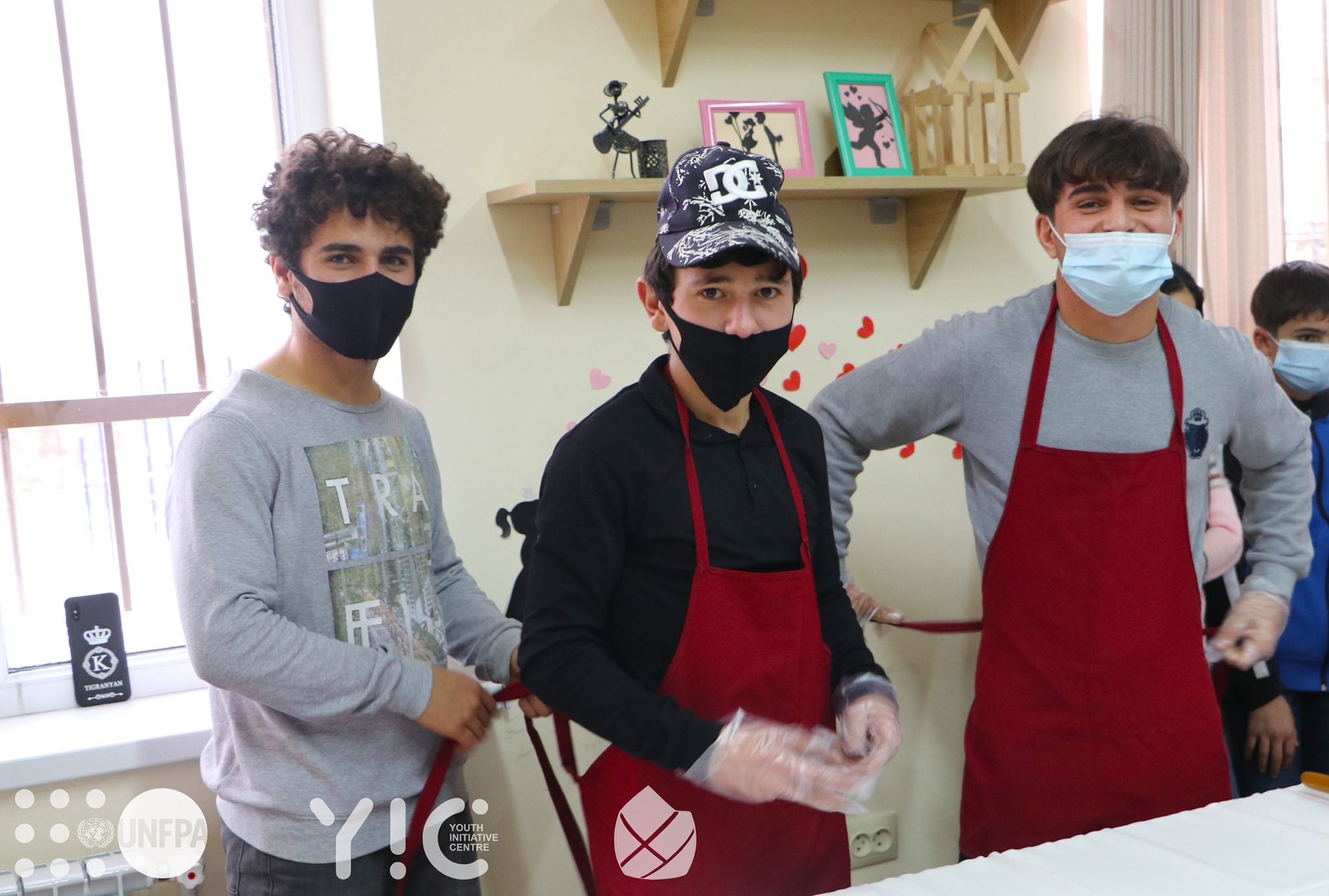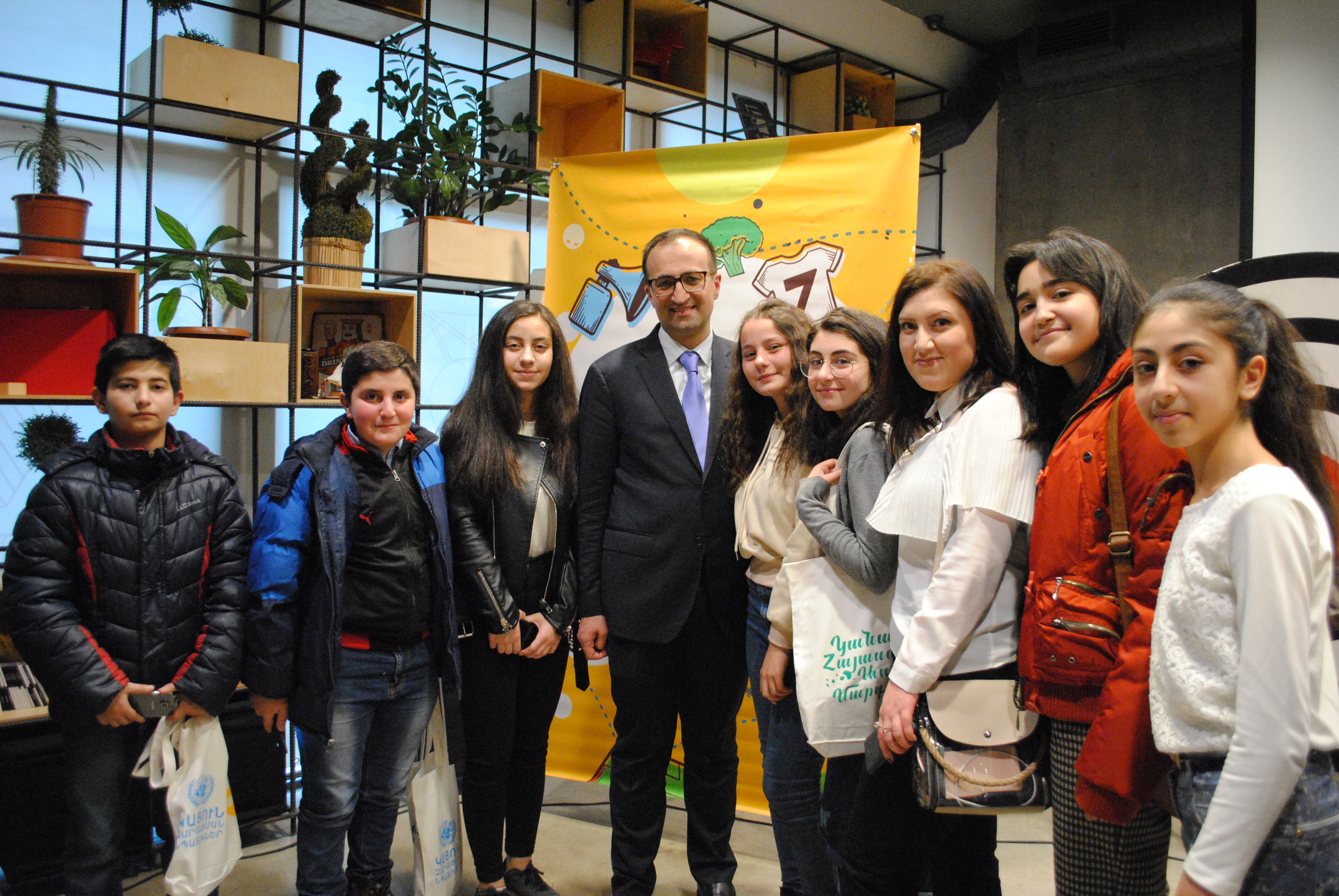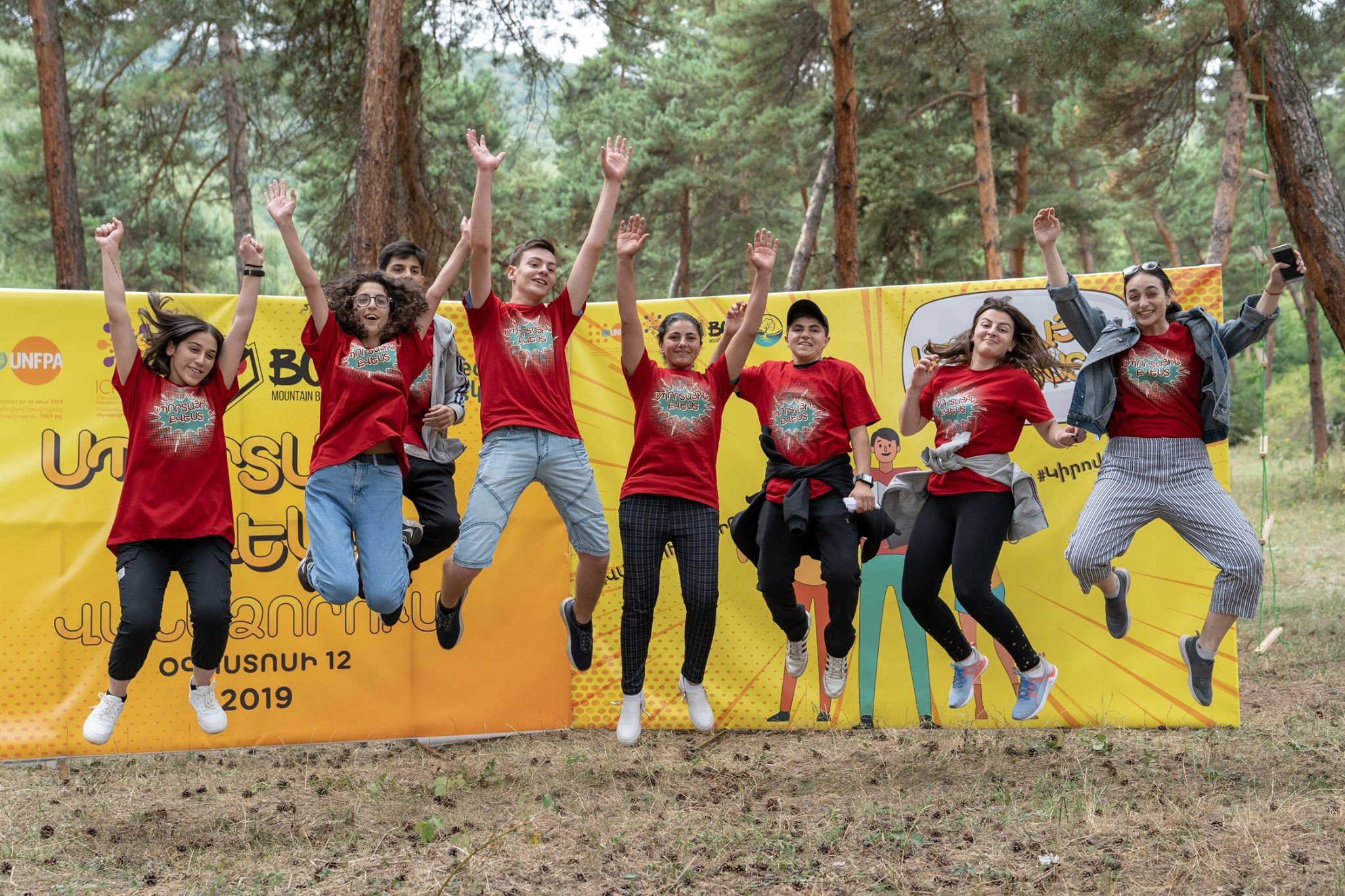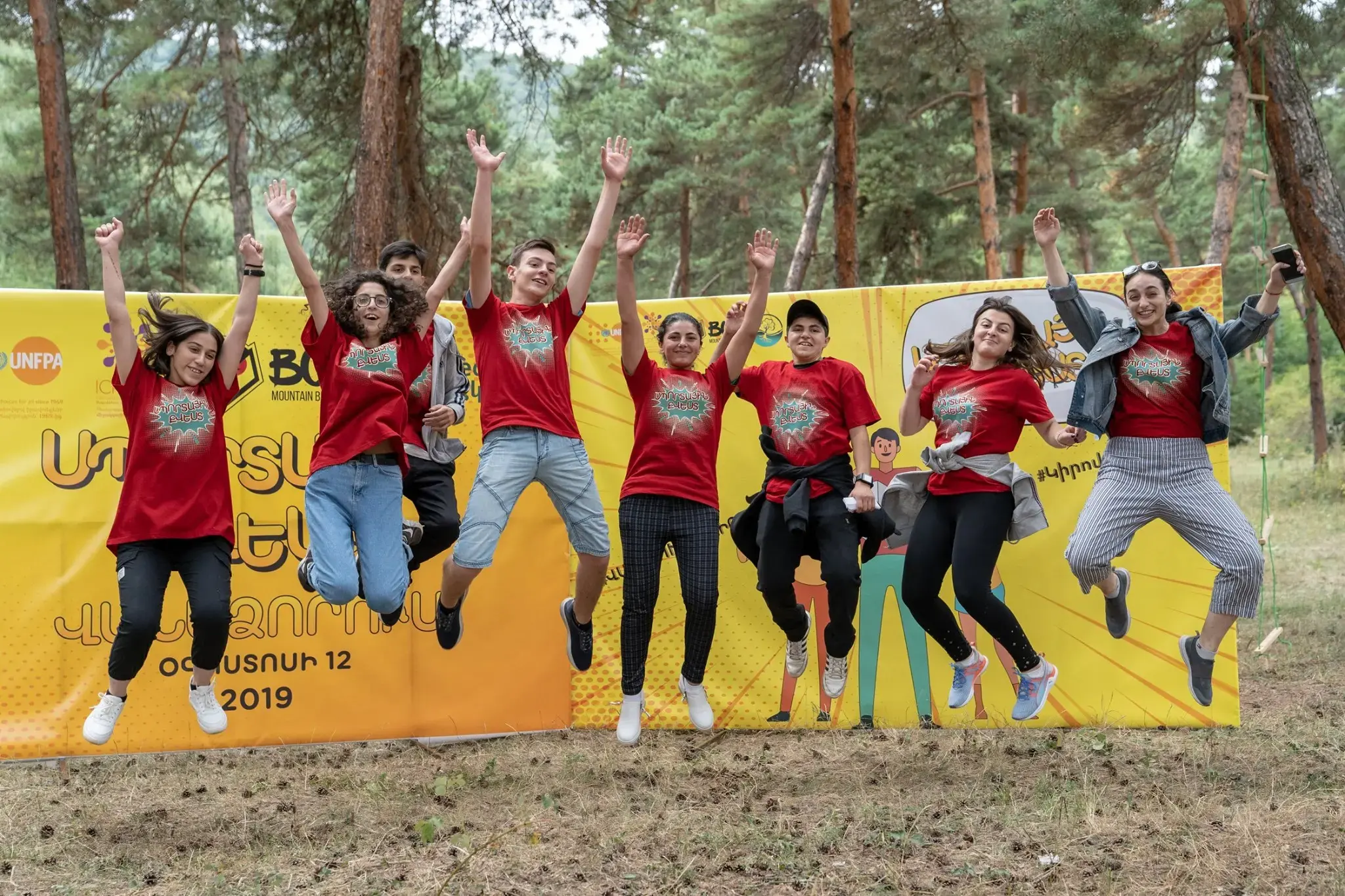UNFPA MANDATE
UNFPA is mandated to advance adolescent and youth reproductive health, participation and leadership, and wellbeing – at global, regional and country level through political participation, advocacy, service and data interventions. UNFPA partners with young people, helping them participate in decisions affecting them, and strengthening their ability to advance human rights and development issues such as health, education and employment.
2021-2025 COUNTRY PROGRAMME GOALS
The youth component of the UNFPA Armenia country programme 2021-2025 is aimed at strengthening skills and opportunities for adolescents and youth to ensure healthy lifestyle choices, leadership and participation. The program aims to mitigate adolescents’ risk of embracing harmful behaviours while promoting positive and protective factors that support youth development.
In particular, by 2025:
- School-based “Healthy lifestyle” education curricula will be operationalized including for students with disabilities;
- Adolescent health care services will be improved at primary health care facilities;
- Youth leadership and participation will be promoted through various youth-led initiatives.
RESULTS ACHIEVED IN PAST YEARS
2020
● An expert review of the online module of the reproductive health (RH) section of the school-based “Healthy lifestyle” training course to the needs of students with disabilities was conducted. UNFPA also contributed to state educational reform and liaised with the MoESCS and other partners to make sure that healthy lifestyle education is prioritized and is part of the new curriculum.
● Opportunities for adolescents living in poverty or who have a disability to participate in distance school education, which was launched as a response to COVID-19 pandemic was enhanced by providing 250 tablets to the MoESCS.
● A study on COVID-19 impact on youth mental health was conducted in order to inform and strengthen upcoming state strategies, policies, and programs in the area of youth.
● Digitalization of clinical guidelines and protocols on adolescents’ reproductive health (the guidelines were incorporated in AAOG-Guidelines mobile app for doctors) increased accessibility of the guidelines and strengthened the capacity of service providers to provide evidence-based quality health services to adolescents.
● Soft skills of 10 young people living in the poorest region of Armenia (Shirak) were built through internship programmes, which increased their competitiveness and decent job opportunities in the labor market.
● Advocacy and promotion of youth engagement, creativity, leadership, and volunteerism through various events and initiatives on International Youth Day and International Volunteer Day initiatives strengthened youth leadership and participation.
● Skills of 85 adolescents who spontaneously arrived from Nagorno-Karabakh to Shirak region and theirs peers living in Shirak were built on the first response in emergency situations, first aid and media literacy, as well as skills of their mothers, were built on positive parenting and hygiene kits were provided to their families, which strengthened their capabilities to be effective humanitarian actors and enhanced their resilience.

● Capacities of the Y-peer Armenia network were built on the provision of basic psychosocial support in emergencies. UNFPA and Y-peer joint project supported education continuity for 100 adolescents, who spontaneously arrived from Nagorno Karabakh to the Armavir region during the conflict escalation by the provision of school supplies and basic psychosocial support.
● UNFPA ensured continuity of rehabilitation services for 150 adolescents with mental disabilities by the provision of PPEs starting from July to service providers of “Source” and “Step Forward” NGOs, working with adolescents with disabilities.
2019
● UNFPA supported the Ministry of Education, Science, Culture and Sports to address the challenges associated with the actual delivery of sexuality education at schools . In collaboration with the Ministry of Education and local regional administrations an interactive online module on Reproductive Health section of "Healthy Lifestyle" school-based programme was piloted and tested in 100 schools located in urban and rural communities of three regions of Armenia (Armavir, Syunik and Shirak). The piloting helped to collect feedback from beneficiaries and revealed areas for improvement.
● UNFPA supported the Ministry of Health to generate data and evidence as well as to strengthen the capacity of healthcare practitioners in providing quality sexual and reproductive healthcare services for adolescents and youth. In collaboration with the American University of Armenia an assessment of adolescent friendly services in primary healthcare facilities was conducted to provide evidence to the Ministry for improvement of those services.
● The capacity of 14 pediatric gynecologists was strengthened by development and interactive introduction of two evidence-based national clinical guidelines on “Management of polycystic ovary syndrome in adolescents and “Management of primary dysmenorrhea”.
● UNFPA also created opportunity for 50 adolescents living in regions, with disabilities, autism spectrum disorders etc to meet with the Minister of Health to provide their feedback on healthcare services and discuss a variety of issues related to healthy lifestyle. The discussion was followed by a theatre-based game during which the adolescents were sensitized about the importance of responsible behaviour in maintaining their own health, healthy lifestyle and healthy choices.

● UNFPA created opportunity for empowerment of young girls living in bordering communities to gain access to productive employment and decent work. As a result of a five month training and mentorship programme for 15 teens from Tavush region acquired tech and business skills and developed projects by examining their community problems. Using acquired knowledge, skills and online tools they were able to create websites for their projects and to develop solutions for sustainability of their projects.
● International Youth Day 2019 was marked in 2 cities with large scale and involvement of about 15 partner organizations working in the field of youth. UNFPA was co-chairing with the Ministry of Education, Sciences, Culture and Sports the coordination of the events in Vanadzor city (Youth Capital 2019). UNFPA empowered youth by supporting a number of events; starting from Sports Quest, a panel discussion on challenges and importance of transforming education with the Minister of Education, Science, Culture and Sports and Vice President of the National Assembly, opportunity fair, workshops on self-learning, digital footprint, volunteering, career planning, online learning etc and open air concerts in Vanadzor and Gyumri.

● Initiatives were taken to reach adolescents and youth with disabilities. In particular, support was provided to “Inclusive Gym Hand in Hand” to provide free of charge quality sport classes for adolescents with autism spectrum disorders and different behavioral impairments.
● UNFPA supported capacity building and strengthening of Y-peer Armenia network. UNFPA supported the network in hold meetings and development and implementation of network 2 projects. The first project implemented in Kapan City, Syunik sensitised 15 participants regarding responsible production and consumption. The second project developed skills of 15 young people living in communities of Armavir in teamwork, conflict management, non-violent communication and also in project writing and budgeting. Over the next month, participants have implemented their project ideas in their communities.
● UNFPA enabled participation of youth representatives in ICPD 25 youth model and Nairobi summit to ensure that Armenia has its contribution and commitment in global youth development agenda and framework.
2018
● A meeting of 50 adolescents (including those living in regions, with disabilities, with diabetes etc.) with the newly appointed Minister of Health was organized to provide their feedback on healthcare services, and to speak about their expectations from healthcare system. The meeting was followed by a theatre-based game to sensitize the adolescents about the importance of maintaining their health, and to promote healthy lifestyle and healthy choices.
● In close cooperation with the Ministry of Education, an interactive online module on Reproductive Health section of "Healthy Lifestyle" school-based programme was finalized and presented to the Ministry for approval and endorsement of its usage in schools. The methodology and the tools for piloting and testing of the online module in schools were developed.
● UNFPA continued its support to the Ministry of Health to strengthen the capacity of health care practitioners in providing quality sexual and reproductive healthcare services for adolescents and youth. Three evidence-based clinical guidelines on 1) Management of polycystic ovary syndrome in adolescents, 2) Management of ovarian masses in adolescents and 3) Management of precocious puberty were developed.
● Two one-day workshops were organized for pediatric gynecologists, where the topics of new clinical guidelines were discussed. The practitioners agreed on the scope of clinical questions for the new guidelines as recommended by international standards of guideline development as well as discussed issues related to the introduction and implementation of the guidelines.
● UNFPA supported and took part in the Fourth Hartak (“Platform”) Workshop Festival for Young People. The Festival was held in Gyumri and included more than 40 workshops on arts and crafts, design, technology, and healthy lifestyles, with over five hundred participants.
● Acknowledging the need of promotion of youth volunteerism, leadership and enhancing youth involvement in the community life, UNFPA in cooperation with Tavush Diocese of the Armenian Apostolic Church supported the 2018 Haghartsin Week, youth-initiated festival run by young volunteers from Tavush region of Armenia.
● International youth day 2018 was marked with unprecedented scale and involvement of about 20 partner organizations working in the field of youth. UNFPA was co-chairing with the Ministry of Sports and Youth affairs the coordination of the events in Ijevan city (Youth Capital 2018). UNFPA supported a number of events; starting from a press conference in Gyumri, Shirak region on July 10, a Color Festival in Gyumri on July 11, continuing to Youth Opportunities Conference in Ijevan, a theatrical SDG quiz game and an open air concert on July 12, and SGD forest quest game in the nearby forests of Gosh community on July 13 and 14 (video link: events in Ijevan).
● UNFPA supported capacity building on reproductive health of 10 youth workers, who work with the adolescents from disadvantaged families from Gyumri city and nearby communities by organizing a three-day ToT for youth workers of KASA humanitarian foundation and Youth Initiative Center NGO. The training was conducted using peer-to-peer methodology and was led by psychologist and members of Y-Peer Armenia network.
● Collaborating with an educational psychologist UNFPA Armenia organized two social media live Q&A sessions devoted to psychological, reproductive health and other issues of teenagers.
● Initiatives were taken to reach adolescents and youth with disabilities. In particular, support was provided to "Step Forward" NGO to establish “Inclusive Gym Hand in Hand” to provide free of charge sport classes for adolescents with autism spectrum disorders and different behavioral impairments.
● UNFPA supported capacity building and strengthening of Y-PEER Armenia network. A three-day training of trainers was organized 15 new peer educators to increasing the capacity of Y-PEER Armenia in delivering sexual and reproductive health and rights training sessions for young people. The most successful 3 participants further conducted trainings for youth workers in Gyumri. UNFPA also supported the Y-PEER Armenia network to hold its annual board meeting and project development training for the network members. The Y-PEERs finalized the SDGs-related 2 project proposals developed in 2017 and implemented them in November 2018. One of the projects was implemented in Berd city, where Y-Peers during two day introduced CV writing and successful interview skills as well as delivered workshops on music and its genres, cinematography, different aspects of art and technology tools to about 80 young people from war-affected bordering villages of Tavush region. The second project was implemented in the Gavar and aimed at decreasing of discrimination among adolescents aged 11-14 through increasing awareness and sensitization about various types of discrimination by using theatre based technique of peer education.
2017
● UNFPA supported MoH in building skills and coordination of newly established MoH Youth Council, which consists of 42 members, who are students of Yerevan State Medical University and American University of Armenia as well as young doctors of different specialties from Yerevan and regions. Several advocacy meetings were held with the MoH Head of Staff to discuss the coordination mechanisms and responsibilities of the Council. As a result, the launching meeting of the newly established Youth Council took place on August 17 and was facilitated by the Minister of Health, who encouraged young people to play an active role in healthcare reforms initiated by the Ministry. As a follow up to launching meeting, a two-day working meeting was organized for the 23 members of Youth Council, during which the Charter of the Council and the Workplan were developed. Overall, the support provided by the UNFPA to the newly established MoH Council ensured that young people had adequate capacity and information to express their views to decision-makers and to contribute to strengthening of national laws, policies and programmes in the area of healthcare.
● UNFPA supported MoH in development of 2 national guidelines on 1) Management of Bacterial Vaginosis in Children and Adolescents 2) Management of Abnormal uterine bleeding in Adolescents. The recommendations of the new national evidence-based guidelines were also presented and discussed with the respective health care providers during a one-day workshop conducted for the pediatric gynecologists. The guidelines strengthened capacity of national institutions and heath care providers to provide quality reproductive healthcare services for adolescents and youth.
● Together with the Y-Peer Armenia awareness raising sessions on Sustainable Development Goals (SGDs) were conducted at the UN house. As a continuation to SDG sessions a two-day training on “Leadership, Advocacy and Project Development” was organized for around 20 young people from high schools, colleges, and leading universities of Armenia to provide the young people necessary knowledge and skills to develop and advocate their project ideas on youth participation in promoting and contributing to achievement of SDGs in Armenia. The SGD sessions initiated by the UNFPA turned into larger scale campaign in partnership UN Department of Public Information Yerevan Office and involved also Youth from different regions of Armenia.
● UNFPA CO in cooperation with Gyumri Youth Initiative Centre also initiated the implementation of large-scale public events dedicated to the International Youth Day, including a press conference in Gyumri; a unique Youth Camp held for the first time in Armenia in the Gyumri Technology Center; a dance flash mob in Gyumri Theatrical Square with the participation of around 100 young people; an open-air concert. Prior to the events of the International Youth Day two youth contests have been announced: A contest for songwriting and a contest of the best project idea for Shirak region a partnership with the Awesome Foundation Yerevan. The results of the two contests for songwriting and the best project idea for Shirak region were announced during the concert.
● Initiatives were taken to reach adolescents and youth with disabilities. In particular, support was provided to "Source" Foundation Supporting the Children with Disabilities and their Families to establish sewing center for the children and their young mothers, who face serious issues finding jobs as they devote most of their time to taking care of their children and don’t have the chances to begin or continue their study or careers.
● UNFPA CO provided support to the Institute of Child and Adolescents Health in conduction of National Health Behavior Survey in School-aged Children of Armenia 2017-2018 to make available evidence needed to support and advocate for effective policies and programs as well as to enable the Government and partners in designing targeted health, educational and social interventions for adolescents and youth.
2016
● Teaching content and methodology of healthy lifestyle education has been reviewed according to the Sexuality Education Review and Assessment Tool (SERAT) and presented to the relevant stakeholders.
● Awareness Raising Trainings on Reproductive Health and Rights for Adolescents including youth living with disabilities was conducted.
● Event for the promotion of healthy lifestyle including reproductive health among youth is organized.
● The Report of Health Behaviour in School-aged Children (HBSC) Study conducted in Armenia was published in 400 copies (in Armenian and English) and launched.
● Protocol on Youth Reproductive Health Counseling for health care workers was developed.
ACTIVITIES AND ACHIEVEMENTS BEFORE 2016
● One of the major achievements of the UNFPA Armenia in the field of youth RH was the introduction of the Healthy Lifestyle education curriculum (in 2008) in the state education program for 8-11 grade students of all schools in Armenia․
● A number of initiatives have been undertaken to strengthen youth sexual and reproductive health including the Reproductive Health Initiative for Youth in the South Caucasus (2007-2009) project co-funded by the European Commission (EC) and UNFPA; Youth Peer Education (Y-PEER) Network in Armenia; joint cooperation on “Capacity building in HIV and AIDS Prevention” in a UN Joint Programme (UNAIDS, UNFPA, UNICEF, UNDP); and the establishment of 34 youth-friendly health service (YFHS) centers all over Armenia with support by UNFPA.


